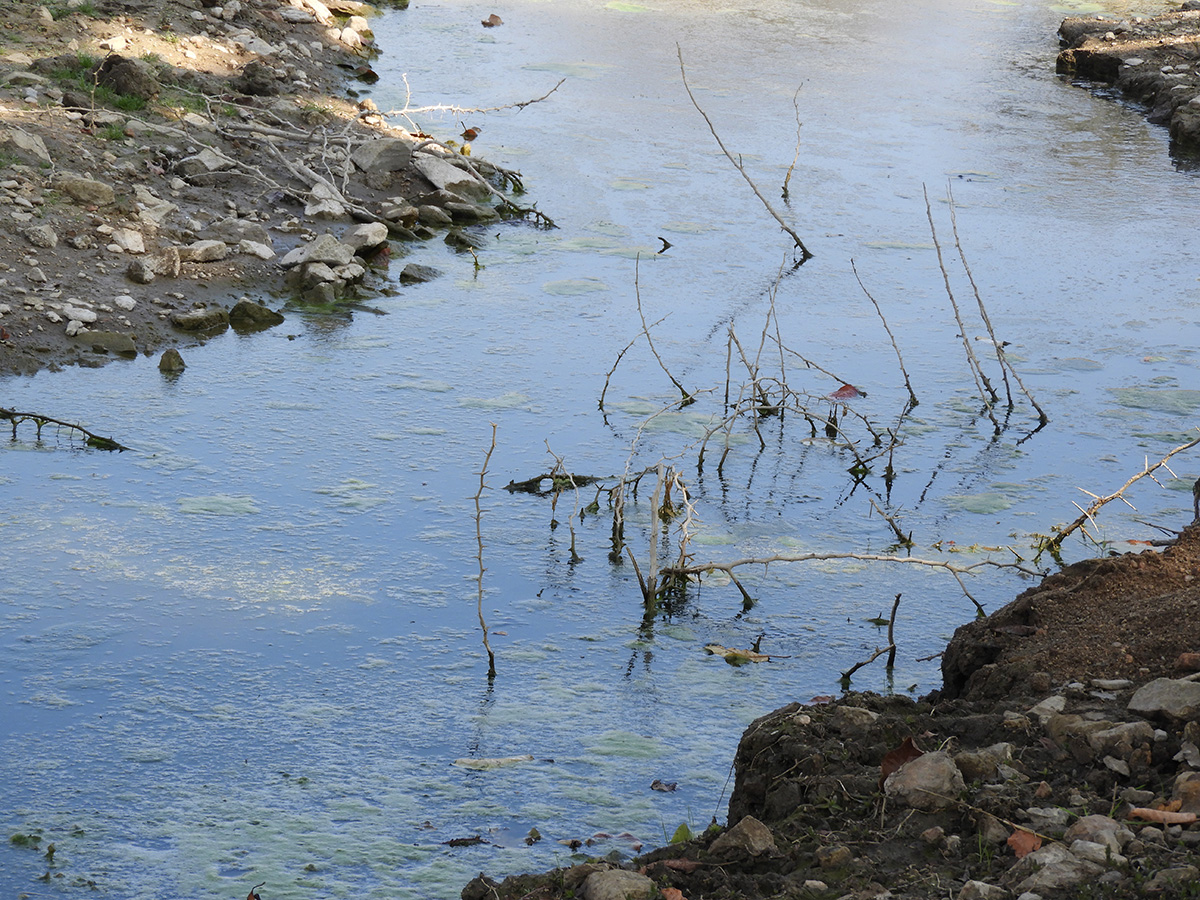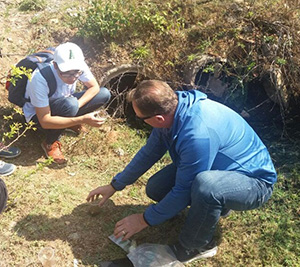
An image of the lake acting as the sole water source for a community outside Udaipur.
Below: Wei Zhang (left) and Jerry Hanna (right) visiting the site.
Just outside of the city of Udaipur in Rajasthan, India is a small co mmunity that sits on the bank of a lake. Over the last few decades, the health of children and young adults in the community had declined. So too have the crops the community members plant as their main source of income.
mmunity that sits on the bank of a lake. Over the last few decades, the health of children and young adults in the community had declined. So too have the crops the community members plant as their main source of income.
The culprit is a zinc mining plant that has been dumping waste and chemicals into the water for decades, contaminating the community's only water source. Despite attempts to intervene, the practice has continued unabated, and the negative impact upon the lakeside community has only worsened.
But a new potential solution has come to light, in the unlikely form of a group of six young people from around the world. Amongst them was graduate student Wei Zhang from the University of Alberta's Department of Chemistry and former research staffer Kevin Marakna. They were also joined by Michael Serpe, associate professor, and Jerry Hanna, president and CEO of Clearflow Group Inc.
"Our team would like to make bio-char filters, using natural substances and agricultural waste found within the community, like coconut shells, rock, and sand," explains Zhang. "Acting as a natural filtration system, the absorbent material will filter bacteria and chemicals, making the water safe to drink."
How did this inventive idea develop? Enter the Water Innovation Lab, an immersive, 12-day experience that brings resource experts and emerging minds from around the world to India to discuss a problem that is common to all of us-water.
The Water Innovation Lab
From January 18 to 29, six resource experts and 40 delegates participating in the Water Innovation Lab 2017 toured Bombay, Bhuj, and Udaipur, meeting with communities and examining the water systems and problems therein.
"The people who live in the communities we visited know best about the water issues they face," says Serpe, associate scientific director of IC-IMPACTS. "They deal with it every day, and we are there to learn from them. Our experience is different, so, we want to find ways to combine our expertise to solve the problems they are facing."
IC-IMPACTS (the India-Canada Centre for Innovative Multidisciplinary Partnerships to Accelerate Community Transformation and Sustainability) is the first, and only, Canada-India Research Centre of Excellence. IC-IMPACTS supports the Water Innovation Lab through funding, planning, and human resources, in conjunction with Waterlution, a non-profit organization that hosts other installations of the Water Innovation Lab around the world.
The delegates, aged 24 to 35, were a diverse group-made up of academics, artists, engineers in all different stages of their lives and careers from across the world. From art to industry to research, each one was connected to water in some way. Their diversity, Zhang recalls, was one of their greatest strengths. "Getting different perspectives and discussing the unique challenges we face is important," Zhang explains. "Each delegate brought different knowledge, experiences, and their own cultural perspective on how to solve problems."
Supporting the delegates were six resource experts, established academics and industry leaders in the fields of water and hydrology, including Serpe and Hanna.
"As resources guests we learned from one another as well as from the students," explains Hanna. "With diversity came both new ideas and new ways of sharing these ideas."
Teams of delegates formed to tackle a water problem commonly found in the communities they visited. Resource guests provide their support and expertise and, at the end of the trip, each group presented a project proposal. But the work does not stop there.
"Many of the groups have taken their projects home with them, conducting research and searching for funding to make their ideas a reality," explains Hanna, the resource expert paired with Zhang's team and long-time partner of the University of Alberta. "Down the road, there is the potential to develop a business model to help address similar challenges in other communities, building a new industry and creating jobs for the residents."
"This isn't like finishing an assignment. We were in India to develop these ideas, and now we hope to bring them to fruition." -Wei Zhang
Unexpected outcomes
Some of the most powerful experiences were for the delegates and resource experts themselves.
For Zhang, attending the Water Innovation Lab and continuing to collaborate with his team members in the aftermath has been nothing short of empowering. "This opportunity has made me feel confident, in a way I haven't before," he explains. "We were exposed to many brilliant and diverse people, both in India and in the Lab. While they gave advice on our projects, shared their knowledge and experience, but they also wanted to know about my plans after graduation, and to share their connections and personal experiences."
As for Serpe, interacting with a group of innovators as diverse as those found at the Water Innovation Lab was a powerful reminder of why he became an educator in the first place. "If you're a little uncomfortable, you know you're doing something right," he says. "You can be an entrepreneur. You can be in industry. You can start your own business. You can stay in academia. And, no matter what you choose, remember that valuing diverse perspectives is important and that many problems are solved by being open minded."
So, what's next for the community near Udaipur? Zhang says that his group is working together to put the finishing touches on their refined proposal before applying for funding. The next step will be collecting materials from the community, and building a prototype bio-char filter.
"I want to see this project through," he says. "This isn't like finishing an assignment. We were in India to develop these ideas, and now we hope to bring them to fruition."